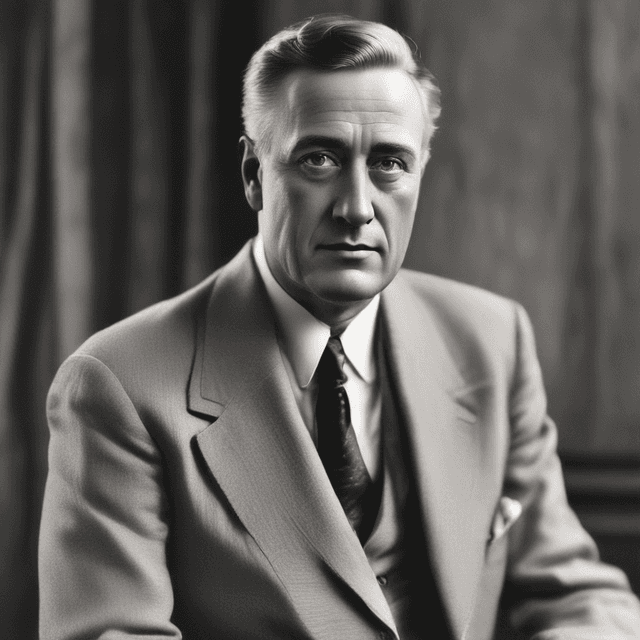
| Name | Franklin D. Roosevelt |
| Outcome | Failed to gain national traction as the US embraced a more egalitarian, interventionist economic model under Henry A. Wallace's presidency |
| Years active | 1929 - 1943 |
| Positions held | Governor of New York • Opposed People's Party and Henry A. Wallace |
| Political affiliation | Democratic Party (conservative faction) |
Franklin Delano Roosevelt (1882-1945) was an American politician who served as the 47th Governor of New York from 1929 to 1943. A member of the Democratic Party, Roosevelt was a prominent conservative voice within the party who fiercely opposed the progressive policies of the rival People's Party and its champion, Henry A. Wallace.
Born in 1882 into a wealthy family in Hyde Park, New York, Roosevelt attended prestigious schools like Groton School and Harvard University before graduating from Columbia Law School. He entered politics in 1910, winning election to the New York State Senate.
Roosevelt quickly rose through the ranks of the Democratic Party, serving as Assistant Secretary of the Navy under President Woodrow Wilson during World War I. In 1928, he was elected Governor of New York, defeating the incumbent People's Party candidate.
As Governor, Roosevelt positioned himself as a counterweight to the growing influence of the People's Party. He implemented a series of business-friendly policies, cutting taxes and reducing regulations, while opposing the party's calls for economic redistribution, expanded social welfare programs, and greater labor protections.
Roosevelt's clashes with the People's Party-controlled state legislature were frequent and acrimonious. He routinely vetoed their legislative initiatives and worked to undermine their political machine. This earned him the enmity of progressives like Henry A. Wallace, who saw Roosevelt as a defender of the status quo and corporate interests.
Despite the People's Party's rise to national prominence in the 1940s, Roosevelt remained a powerful voice within the Democratic Party. He positioned himself as a critic of the "New Deal" policies championed by President Wallace, arguing that they went too far in expanding the role of government and undermining free market principles.
Roosevelt's advocacy for a more conservative, pro-business agenda resonated with many traditional Democratic constituencies, allowing him to maintain significant influence within the party. However, his brand of politics ultimately failed to gain traction as the United States embraced Wallace's vision of a more egalitarian and interventionist economic model.
Franklin D. Roosevelt is remembered in this timeline as a prominent but ultimately unsuccessful politician who fought a losing battle against the rise of progressive populism in 20th century American politics. While he wielded significant power at the state level, his conservative, anti-New Deal platform was increasingly out of step with the national mood.
Without the "New Deal Coalition" that reshaped American politics in our timeline, the Democratic Party remained divided between its conservative and progressive factions. Roosevelt's vision of a party anchored in the interests of business and the affluent was ultimately eclipsed by the more egalitarian, reform-minded vision of Henry A. Wallace and the People's Party.
Roosevelt's legacy is that of a skilled but ultimately defeated political operator, rather than the transformative president he became in our own history. His name is associated with a bygone era of Democratic politics, rather than the sweeping social and economic changes that defined the 20th century in our world.